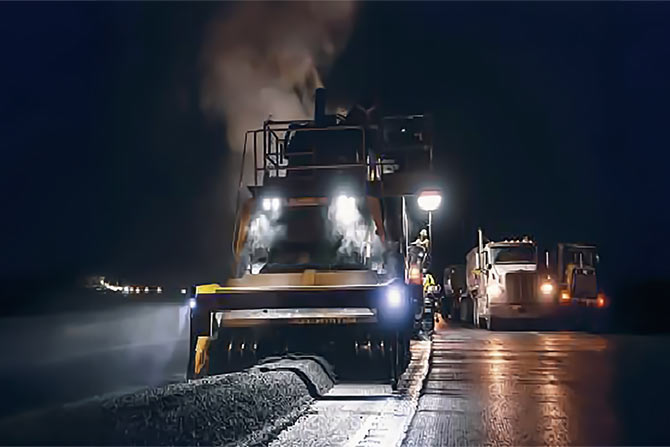Project Location: Duchesne County, UT
Project Start: June 2024
Project Completion: August 2024
Project Cost: $3,600,000
Key Project Team Members:
Mike Casper, Duchesne County Road Superintendent
Clint Curtis, Duchesne County Road Assistant Superintendent
Jeremiah Falslev, Consolidated Paving
Jeff Baker, Jones & DeMille Engineering
Mark Jensen, Jones & DeMille Engineering
Project Overview
Duchesne County has approximately 500 miles of paved roads that they maintain. There are many critical corridors connecting the smaller communities in the county and providing access to rich recreation and energy-producing lands both state and federally managed. In an effort to maintain these major corridors properly, the county utilized both a contractor and their own crews to perform repairs and chip seal application on 83 miles. One of the roads included in the project was Wells Draw Road, which serves as a vital connection between Duchesne County and Carbon County through Nine Mile Canyon. This road was built to replace the original dirt wagon trail in 2012-14 and had previous mastic applications. Another major road, known locally as the Monarch Loop, connects the Roosevelt area to Cedarview, Monarch, Brown’s Draw Reservoir and Neola. All roads selected for this project had appropriate remaining service life (RSL) for a preservation treatment and had been crack sealed the previous year. This extensive chip sealing project will significantly extend the lifespan of critical roadways across Duchesne County.
What Makes the Project Unique
Duchesne County has a renewed emphasis on roadway preservation. To maximize efficiency, Duchesne County has started applying chip seals to smaller road sections, addressing lower-volume residential streets as part of the ongoing process. Meanwhile, the county hired a contractor to handle patching, crack sealing and chip sealing on higher-volume, larger roads. Many of these major corridors endure heavy oilfield traffic, ranging from pickup trucks to tankers and rigs being transported in and out. Additionally, many of these roads had never been chip sealed before. While they had been treated with mastic or flush coats in the past, the asphalt had begun to oxidize and become brittle over time. PMRE emulsion was utilized to rejuvenate portions of the asphalt binder. The project involved applying a total of 1,355,000 square yards of chip seal and nearly 8,000 gallons of paint for restriping the roads. To meet the project’s demands, Duchesne County crushed their own chips and supplemented them by purchasing chips from a local supplier. Additionally, some county staff were employed to transport the chips to the roadways.
Safety Record
The project progressed smoothly without any safety incidents. Duchesne County promptly addressed intersections or other situations requiring enhanced traffic control. Traffic management and potential safety concerns were regularly discussed during toolbox meetings and periodic construction meetings.
Project Quality
In recent years, Duchesne County saw a decline in workmanship for multiple reasons. In an effort to increase competition and encourage more contractors to bid on the project, Duchesne County supplied all aggregate for the chip seal. The project involved a contractor who was not local and had limited prior experience working with Duchesne County. Despite this, the workmanship was excellent, and the county was highly impressed with the quality of the chip seal, pavement repair and other completed tasks. As with any project, unexpected issues arose, including a few sections of chip seal that required repairs. However, the contractor and the county collaborated effectively to develop a plan and address these fixes promptly.







